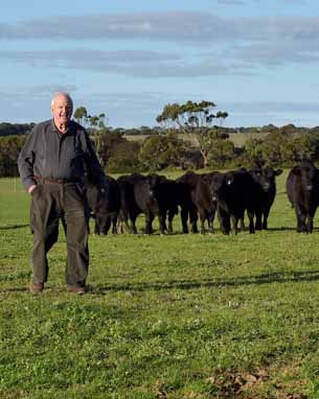 Bob Davies at Bimbadeen, the scene of his ground-breaking trials of carbon farming. There is plenty happening locally to give us heart, writes Michael Whelan
Bob Davies at Bimbadeen, the scene of his ground-breaking trials of carbon farming. There is plenty happening locally to give us heart, writes Michael Whelan WORKSHOP sessions at the Climate Emergency Summit in Melbourne last weekend filled up quickly so I didn’t get to all of the sessions I would have liked. Inevitably such large gatherings become more of a spectator event than a working strategic session.
In this climate change journey we find ourselves frustrated at the lack of government action, incredibly concerned for our children and grandchildren and jaded with the overload of tragedies that are occurring globally. Many of the speakers at the Summit reflected this frustration, speaking at length of the dark future if we don’t take strong action.
But not enough was said about what a strong approach looks like and the benefits it would bring humanity and the creatures we share the planet with.
The Green New Deal borrows from Roosevelt’s New Deal during the Great Depression of the 1930s. I tend to think of it along the lines of the Third Industrial Revolution espoused by Jeremy Rivkin. Rivkin describes the change as the equivalent of the change from steam to the internal combustion engine. A radical transition that will leave many current industries – such as coal and fossil fuel extraction – as stranded assets. The economic role for discovered coal and fossil fuel in the new economy will be as carbon credits for foregone exploitation rights.
Black Rock is the world’s largest fund manager, with trillions of dollars in fund assets. It recently announced its total divestiture from coal stock. The World Economic Forum has identified the failure to respond to climate change as the biggest threat to the global economy.
We must respond, but how will the business future in Bass Coast look? We are a prime area for carbon farming with some local farmers leading the way. Carbon farmers of the year Bob and Anne Davie on Phillip Island and Bass Coast Landcare are exploring new ways to farm and join the carbon market. Economist Ross Garnaut predicts that in the near future farmers will make more money from marketing carbon than selling livestock.
Cleaner waste and landfill is already being delivered through the Bass Coast Council’s food and garden organics (FOGO) initiative, achieving a 76 per cent diversion from waste with just 1 per cent contamination.
In the future we should regard FOGO as a resource and process it here in Bass Coast for Bass Coast farms and to assist in carbon sequestration. Jobs will come from processing as they will from the marketing of carbon. Some farmers in South Gippsland already differentiate their product on quality as carbon free and grown by regenerative farming techniques.
Bass River Dairies haven’t waited for the State Government to sort itself out on the container deposit scheme. They have taken the great initiative of selling milk in glass bottles, introducing their own deposit scheme, and it is the best milk around.
A couple of cafés on Phillip Island already have zero waste. Plastic Free Phillip Island and Bass Coast groups have pioneered plastic reduction here. On a personal level I recently ditched the plastic containers opting for shampoo and conditioner as soap bars from the local health food shop. I am almost plastic free and loving it.
A business in Ballarat has developed technology for processing soft plastic. Why couldn’t we licence that technology to use locally and use the products such as seats and other outdoor furniture in our own parks and gardens? Totally Renewable Phillip Island (TRPI) is working on a community energy project that will give them clean energy and control over energy prices as well as projects to deliver food security and clean transport.
While I didn’t get this discussion from the Summit, I am enjoying participating in that work with TRPI and supporting those local businesses that are having a go.
Council’s new Climate Emergency Community Reference Group commenced on Friday and will help prepare a living Action Plan. If we are positive and change the debate from the doom and get going on the new clean sharing economy we will not only be healthier but a thriving business area as well.
Cr Michael Whelan and Cr Geoff Ellis attended the 2020 National Climate Emergency Summit as representatives of Bass Coast Shire Council.